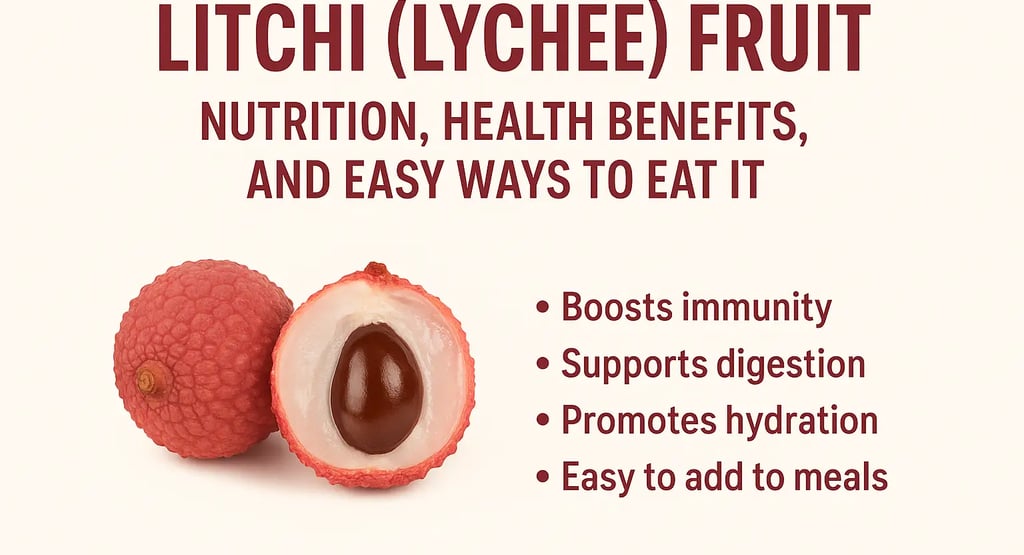Litchi (Lychee) Fruit: Nutrition, Health Benefits, and Easy Ways to Eat It
Discover the amazing health benefits of litchi (lychee) fruit. Learn about its nutrition facts, vitamins, minerals, and delicious ways to include litchi in your daily diet for better immunity, digestion, and hydration.


Litchi (Lychee): Nutrition, Health Benefits, and How to Add It to Your Diet
Introduction to Litchi (Lychee)
Litchi, also known as Lychee fruit, is a tropical delicacy loved for its sweet taste, juicy texture, and floral aroma. Native to the Guangdong and Fujian provinces of China, litchi has a rich history spanning over 2,000 years. Today, it is widely cultivated in tropical and subtropical regions, especially in India, Thailand, Vietnam, and South Africa.
The litchi tree (Litchi chinensis) produces fruits with a rough red shell, translucent pulp, and a large inedible seed. Its flavor is often compared to a blend of grape and rose water, making it a popular ingredient in fruit salads, desserts, and refreshing beverages. Beyond its taste, litchi is valued for its nutritional richness and health-promoting properties, making it a sought-after fruit worldwide.
In Chinese culture, litchi has been a symbol of love and romance and was even enjoyed by emperors. Today, it is both a cultural delicacy and a superfruit, thanks to its impressive nutrient profile.
Nutritional Profile of Litchi
Litchi is often called a nutritional powerhouse because of its wide range of vitamins, minerals, and antioxidants.
Vitamin C: Litchi is one of the richest sources of vitamin C, surpassing even oranges in concentration. This boosts immune health, skin glow, and antioxidant protection.
B Vitamins: Contains niacin, riboflavin, and B6, which support energy metabolism and help the body convert food into energy.
Minerals: Rich in potassium (regulates blood pressure), magnesium (supports muscles, nerves, and bones), and copper (aids red blood cell production).
Antioxidants: Litchi is loaded with polyphenols and flavonoids, which help fight free radical damage.
Compared to other fruits, litchi stands out because it combines hydration, antioxidants, and vital nutrients in one small package.
Nutrition Facts and Health Benefits
Health Benefits of Litchi
Adding litchi to your diet offers multiple science-backed health benefits:
1. Boosts Immunity
Litchi’s high vitamin C content strengthens the immune system and enhances white blood cell production, helping the body fight infections.
2. Supports Digestive Health
Litchi contains dietary fiber, which promotes healthy digestion, prevents constipation, and supports weight management by creating a sense of fullness.
3. Rich in Antioxidants
The antioxidants in litchi protect cells from oxidative stress, reducing the risk of chronic conditions like diabetes, heart disease, and cancer.
4. Keeps You Hydrated
With its high water content, litchi is a natural hydrating fruit, making it ideal during summer to prevent dehydration and maintain skin elasticity.
5. Promotes Heart Health
The combination of potassium, magnesium, and antioxidants in litchi helps regulate blood pressure, support circulation, and improve overall cardiovascular health.
How to Incorporate Litchi into Your Diet
Litchi is not only nutritious but also incredibly versatile. Here are some easy and delicious ways to enjoy it:
Fresh Litchi: Peel and eat the juicy flesh as a snack.
Fruit Salads: Combine with mango, pineapple, or watermelon for a tropical mix.
Desserts: Add litchi to ice creams, sorbets, cakes, or muffins.
Dried Litchi: Perfect for trail mixes with nuts and seeds.
Smoothies & Juices: Blend litchi with yogurt, coconut milk, or lemon for a refreshing drink.
Cocktails & Mocktails: Use litchi juice as a natural sweetener in beverages.
👉 Safety Tip: Avoid consuming unripe litchis in large quantities, as they may cause health issues. Individuals with fruit allergies should introduce litchi gradually. Pregnant women should consume it in moderation.
Conclusion
Litchi is more than just a sweet summer fruit—it’s a nutrient-dense superfruit with powerful health benefits. From boosting immunity and hydration to supporting digestion and heart health, this tropical fruit deserves a spot in your diet. Whether eaten fresh, blended into smoothies, or added to desserts, litchi is a delicious way to stay healthy.
As global demand continues to grow, litchi remains a cultural symbol, culinary favorite, and nutritional treasure loved by people around the world.
❓Frequently asked questions
Q1. What are the health benefits of litchi fruit?
Litchi is rich in vitamin C, antioxidants, and minerals. It helps boost immunity, supports digestion, promotes hydration, and contributes to heart health.
Q2. Is litchi good for weight loss?
Yes. Litchi is low in calories and contains dietary fiber, which promotes fullness and reduces overeating, making it a good choice for weight management.
Q3. Can pregnant women eat litchi?
Pregnant women can enjoy ripe litchis in moderation, but they should avoid unripe litchis as they may cause health complications.
Q4. Does litchi boost immunity?
Yes. Litchi is packed with vitamin C, which strengthens the immune system and helps the body fight infections.
Q5. How can I eat litchi fruit?
Litchi can be eaten fresh, added to fruit salads, blended into juices or smoothies, dried for snacks, or used in desserts like ice cream and cakes.
